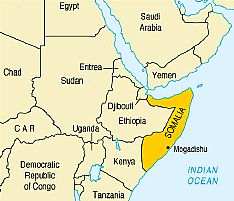 According to Amnesty International, the violations were primarily made by armed groups opposed to the Somali government and African Union (AU) forces. The document also lists allegations of indiscriminate fire by government and AU forces that need to be investigated.
According to Amnesty International, the violations were primarily made by armed groups opposed to the Somali government and African Union (AU) forces. The document also lists allegations of indiscriminate fire by government and AU forces that need to be investigated.
Clear patterns of human rights abuse have emerged during the latest cycle of violence in Somalia, which began when armed opposition groups launched a major offensive against the government in Mogadishu in May 2009, said Amnesty International on 25 March 2010.
Thousands of civilians have been killed and injured by shelling and other heavy bombardment, as armed opposition groups al-Shabab and Hizbul Islam have fought Transitional Federal Government (TFG) and AU forces, primarily in the capital Mogadishu.
“We believe reported cases represent the tip of the iceberg, continuing insecurity has made it desperately difficult to obtain reliable information,” said Erwin van der Borght, Africa Programme Director.
55,000 refuges UN figures estimate that fighting between government forces and insurgents in the city has killed scores of civilians and forced more than 55,000 to flee their homes since the beginning of February 2010.
UN figures estimate that fighting between government forces and insurgents in the city has killed scores of civilians and forced more than 55,000 to flee their homes since the beginning of February 2010.
Some attacks target civilians deliberately. Twenty-three people were killed and 60 injured on 3 December 2009 when explosives ripped through Shamo hotel, which was hosting a medical students’ graduation ceremony.
“No party to this conflict appears to take the necessary precautions to avoid loss of civilian life and injury, despite their obligations to do so under international humanitarian law,” said Erwin van der Borght. “All sides must stop targeting civilians that continue to be unlawfully killed with impunity.”
People living in areas controlled by armed opposition groups are under growing threat of torture and unlawful public killings, including stoning to death, amputations and floggings, under the pretext of maintaining law and order.
“These abhorrent, public displays of cruelty and violence appear to be attempts by armed groups to intimidate and instil fear in the population in order to assert their control over territory,” said Erwin van der Borght.
Journalist, aid workers under threat Delivery of humanitarian aid, desperately needed by those displaced by the conflict, is being seriously hampered by opposition groups that often accuse aid organisations of spying for the international community. At least ten aid workers were killed in the country in 2009 and ten others remained abducted by unknown groups.
Delivery of humanitarian aid, desperately needed by those displaced by the conflict, is being seriously hampered by opposition groups that often accuse aid organisations of spying for the international community. At least ten aid workers were killed in the country in 2009 and ten others remained abducted by unknown groups.
Armed groups also continue to intimidate journalists and impose strict rules on media outlets in a systematic attempt to suffocate freedom of expression.
Nine journalists were killed in 2009; at least three of them were deliberately shot dead. In a positive development, two foreign journalists, Amanda Lindhout (picture above) and Nigel Brennan (picture on the right), were released on 25 November 2009 after fifteen months in captivity following their abduction by an unknown group on 21 August 2008.
journalists, Amanda Lindhout (picture above) and Nigel Brennan (picture on the right), were released on 25 November 2009 after fifteen months in captivity following their abduction by an unknown group on 21 August 2008.
Armed opposition groups have targeted media houses and radio stations by imposing strict rules on those operating in areas under their control, arbitrarily closing radio stations and intimidating journalists. This is part of a systematic attempt by armed groups to suffocate freedom of expression in areas under their control and to strictly control the information that civilians receive in and from those areas.
Amnesty International has urged the TFG, armed opposition groups, the African Union and the international community to implement a set of recommendations in a bid to reduce human rights abuses against civilians and allow safe access to humanitarian organizations.
Here you can find the document “No end in sight: The ongoing suffering of Somalia’s civilians”.





